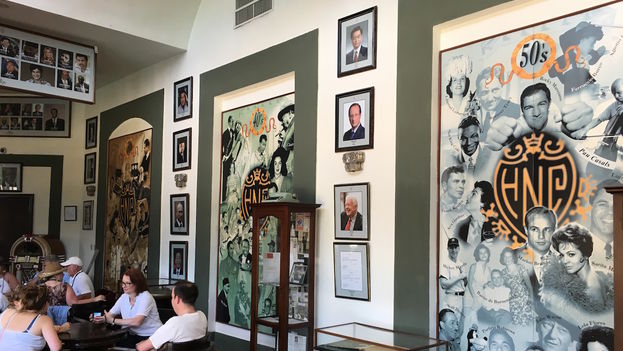
![]() 14ymedio, Generation Y, Yoani Sanchez, Havana, 24 August 2017 — The gallery near the garden displays the faces of dozens of celebrities who stayed at the Havana’s Hotel Nacional. In one corner we see mobster Meyer Lansky, in another the sensual legs of ballerina Josephine Baker and the broad torso of actor Johnny Weissmüller. All belong to that “cocktail of the past” that gives the foreigners who come to visit an ecstatic rush.
14ymedio, Generation Y, Yoani Sanchez, Havana, 24 August 2017 — The gallery near the garden displays the faces of dozens of celebrities who stayed at the Havana’s Hotel Nacional. In one corner we see mobster Meyer Lansky, in another the sensual legs of ballerina Josephine Baker and the broad torso of actor Johnny Weissmüller. All belong to that “cocktail of the past” that gives the foreigners who come to visit an ecstatic rush.
The ruling party has converted the Republican era into its exclusive patrimony. It brings economic benefits to buildings constructed under capitalism, makes the places that served the nightlife of that era profitable, and appropriates the cultural scene of “mediatized Cuba,” as the history books call it.
The first half of the twentieth century has become a commodity, a product sold in tourist packages, souvenirs and through repetitive “canned” music, which appeals to those who want a shot of nostalgia; but it can also spark disgust when the private sector takes advantage of this scenography with its odor of mothballs.
Most of the images disseminated by the Ministry of Tourism exploit the symbolism of the Island during the first half of the 20th century
Cuba’s first vice president Miguel Díaz-Canel expressed his annoyance in a video filmed last February, for what he considers the “eulogy to the Batista era” promoted by many restaurants and cafes through a décor of photos from the era of the Republic. However, in his speech the official conveniently avoided mentioning the use the state itself makes of marketing that country that no longer exists.
Most of the images disseminated by the Ministry of Tourism exploit the symbolism of the island during the first half of the twentieth century, showing the Floridita restaurant/bar, the Bodeguita del Medio or the Tropicana cabaret. The senior officials of Gaviota and other hotel groups collect dollars in exchange for visually exploiting years that they themselves contributed to destroying.
Like all totalitarianism, the Cuban system seeks to control information and silence; the press and rumors; the past and present. Now, it has ended up closing the circle around the memories of Republican Cuba. Only power has the right to evoke that moment and, of course, it does it in its own way.
